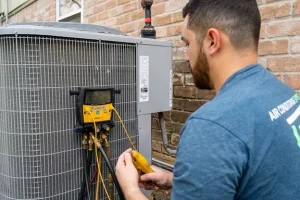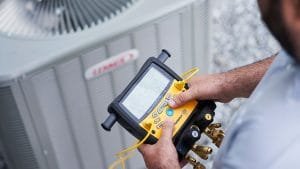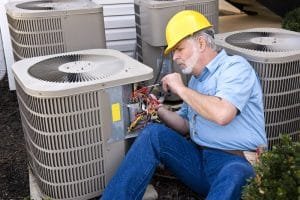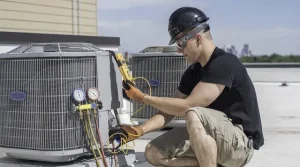
Have you ever wondered how much do HVAC technicians make for their work? It’s an intriguing question that delves into the practical side of a profession that plays a vital role in our daily comfort. HVAC technicians, those skilled experts who handle heating, ventilation, and air conditioning systems, not only keep us cozy or cool, but they also play a significant role in maintaining our indoor air quality.
Now, let’s talk numbers. How much do these technicians make? Well, that’s a question with a few twists and turns. From factors like experience and location to the type of work they specialize in, HVAC technicians’ earnings can vary quite a bit.
So, if you’re curious about the financial side of this hands-on and essential job, buckle up as we embark on a journey to uncover the paycheck realities of HVAC technicians. But let’s start with a brief orientation of the HVAC industry’s importance and growth.
HVAC industry’s importance and growth

The HVAC industry, short for Heating, Ventilation, and Air Conditioning, is more than just a network of technicians tinkering with temperature controls. It’s a cornerstone of modern living, shaping our comfort, health, and productivity.
As our reliance on controlled indoor environments continues to soar, so does the significance of skilled HVAC professionals. They are the unsung heroes behind the scenes, ensuring that our homes, workplaces, and public spaces remain habitable and pleasant, no matter the weather outside.
Also, with the global focus on energy efficiency and sustainability, the HVAC industry’s growth is not just about comfort, but also about environmental responsibility, making it a dynamic and essential field.
Importance of Understanding HVAC Technician Salaries
In this HVAC industry, understanding the financial aspect, particularly HVAC technician salaries is a crucial piece. For aspiring technicians, it’s about making informed career choices, knowing what to expect as they hone their skills. For those already in the field, it’s about evaluating their worth and potential career growth.
Beyond individual considerations, comprehending HVAC technician salaries offers a glimpse into the industry’s valuation of their vital role. It’s a barometer of how society acknowledges and rewards the expertise required to maintain our indoor environments.
So, the purpose of this article is to shine a light on the often-discussed yet sometimes elusive topic of HVAC technician earnings. This insight can empower decision-making, inspire career paths, and foster a deeper appreciation for the dedicated professionals who work tirelessly to ensure our comfort and well-being.
So, if you’ve ever wondered about the dollars behind the ducts, join us as we unravel the earnings of HVAC technicians and uncover the fascinating dynamics at play.
Factors Influencing HVAC Technician Salaries
HVAC technician salaries are influenced by a variety of factors that collectively shape their earning potential and compensation. These factors reflect the diverse aspects of the HVAC industry and the specialized skills required for this vital profession.
Here are some key factors that play a role in determining HVAC technician salaries:
- Experience and Skill Level: Experience is a key determinant of HVAC technician salaries. As technicians accumulate years in the field, their proficiency and problem-solving abilities tend to improve. More experienced technicians often handle complex tasks with ease, which can lead to higher compensation. Skill development, including expertise in newer technologies and equipment, can also positively impact earnings.
- Education and Training: Formal education and training play a significant role in salary levels. HVAC technicians with comprehensive training, such as completing trade school programs or apprenticeships, may command higher wages. Continual learning and staying updated with industry advancements can also enhance earning potential.
- Geographic Location: The region in which an HVAC technician works greatly influences their pay. Areas with higher costs of living or climates that demand more HVAC services may offer higher salaries to attract skilled professionals. Metropolitan areas and regions with extreme temperatures often provide more lucrative opportunities.
- Industry and Type of Work (Residential, Commercial, Industrial): The sector in which a technician specializes affects their earnings. Those working in commercial or industrial settings might earn more due to the complexity and scale of projects. Residential HVAC technicians may find steadier demand but potentially lower compensation compared to commercial or industrial counterparts.
- Certification and Specializations: HVAC technicians with relevant certifications, such as EPA 608 certification for handling refrigerants, NATE (North American Technician Excellence) certification, or manufacturer-specific credentials, can command higher salaries. Specializing in niche areas like energy efficiency, geothermal systems, or smart technology can also contribute to increased earning potential.
It’s important to note that while these factors exert significant influence, individual companies, demand fluctuations, economic conditions, and collective bargaining agreements can further shape HVAC technician salaries.
All aspiring technicians and those already in the field should consider these multifaceted elements when assessing their potential earnings and career trajectories.
Average HVAC Technician Salary

The average HVAC technician salary in the United States is $50,590 per year, or $24.32 per hour. However, salaries can vary depending on experience, location, and the specific duties of the job.
- Entry-level HVAC technicians typically earn between $31,000 and $46,000 per year.
- Mid-level HVAC technicians typically earn between $46,000 and $68,000 per year.
- Senior HVAC technicians typically earn between $68,000 and $80,000 per year.
HVAC technicians in the following states tend to earn the highest salaries:
- Alaska
- Hawaii
- Washington
- Massachusetts
- New York
HVAC technicians who work in commercial settings, such as hospitals and office buildings, typically earn more than those who work in residential settings. HVAC technicians who are certified or have additional training may also earn more.
The job outlook for HVAC technicians is positive. The Bureau of Labor Statistics projects that employment of HVAC technicians will grow 5% from 2020 to 2030, faster than the average for all occupations. This growth is expected due to the increasing demand for energy efficiency and the need to maintain and repair existing HVAC systems.
If you are interested in a career as an HVAC technician, you should have a high school diploma or equivalent. You may also want to consider earning an associate’s degree in HVAC technology. HVAC technicians typically receive on-the-job training from their employers.
How Experience Impacts Early Career HVAC Salaries
Experience has a significant impact on early career HVAC salaries. According to the Bureau of Labor Statistics, HVAC technicians with less than one year of experience earn an average of $45,340 per year, while those with five to nine years of experience earn an average of $64,160 per year. This difference of $18,820 represents a 41.5% increase in salary.
There are a few reasons why experience is so valuable in the HVAC industry. First, HVAC systems are complex and require a significant amount of training and knowledge to repair and maintain.
With more experience, HVAC technicians become more proficient in their work and are able to diagnose and fix problems more quickly and efficiently. This saves employers time and money, which is why they are willing to pay more for experienced technicians.
Second, experienced HVAC technicians have a proven track record of success. They have a deep understanding of the HVAC industry and are able to meet the needs of their customers in a timely and professional manner. This makes them valuable assets to any company and allows them to command higher salaries.
In addition, experienced HVAC technicians are more likely to be certified. Certifications demonstrate that a technician has met certain standards of knowledge and skill, which employers value. This can lead to higher salaries, as well as more opportunities for advancement.
Therefore, if you are considering a career in HVAC, it is important to understand the impact that experience can have on your salary. By gaining experience and becoming certified, you can increase your earning potential and set yourself up for a successful career in this growing industry.
HVAC Technician Salary Growth Over Time

The journey of an HVAC technician’s career is marked not only by technical skill development but also by a steady evolution in compensation. As these professionals gain experience, expand their expertise, and contribute to the industry, their earnings tend to follow a progressive trajectory.
Here’s an overview of how HVAC technician salary growth typically unfolds over time:
Typical Salary Progression with Years of Experience
HVAC technicians typically earn more money as they gain experience. Here is a general overview of how salaries can progress over time for HVAC technicians:
- Entry-level: HVAC technicians with less than one year of experience can expect to earn an average of $40,000 per year.
- Mid-level: HVAC technicians with 3-5 years of experience can expect to earn an average of $50,000 per year.
- Senior-level: HVAC technicians with 7-10 years of experience can expect to earn an average of $60,000 per year.
- Expert-level: HVAC technicians with over 10 years of experience can expect to earn an average of $70,000 per year or more.
Of course, these are just averages and the actual salary for an HVAC technician will depend on a number of factors, such as location, education, certifications, and the specific employer.
Factors Contributing to Salary Increases
There are a number of factors that can contribute to salary increases for HVAC technicians, including:
- Experience: As HVAC technicians gain experience, they become more skilled and knowledgeable, which makes them more valuable to employers. This can lead to higher salaries.
- Education: HVAC technicians who have a degree or certification in HVAC can earn more money than those who do not.
- Certifications: HVAC technicians who earn additional certifications can also earn more money. This is because certifications demonstrate that the technician has the skills and knowledge to perform specific tasks.
- Location: HVAC technicians in some parts of the country earn more money than those in other parts of the country. This is due to the cost of living and the demand for HVAC technicians in different areas.
- Employer: Some employers pay HVAC technicians more than others. This is often due to the size of the company, the type of work that the technician does, and the benefits that the company offers.
Specialized HVAC Technician Salaries

Specialized HVAC technicians often command distinct salaries due to their focused expertise and ability to tackle specialized tasks.
HVAC controls and service technicians typically earn the highest salaries among all types of HVAC technicians. This is because they have the specialized skills and knowledge to install, maintain, and troubleshoot complex HVAC control systems.
Aso, HVAC controls systems are essential for the efficient operation of HVAC systems, and they are becoming increasingly complex as HVAC systems become more sophisticated. This demand for skilled HVAC controls technicians has led to higher salaries for these professionals.
According to the Bureau of Labor Statistics, the median annual salary for HVAC controls technicians was $67,620 in May 2020. This is significantly higher than the median annual salary for all HVAC technicians, which was $50,590 in May 2020.
Here is a breakdown of the average salaries for different types of HVAC technicians:
HVAC Service Technicians:
- Entry-level: $35,000 – $45,000 per year
- Mid-career: $45,000 – $60,000 per year
- Experienced: $60,000 – $80,000+ per year
HVAC Installation Technicians:
- Entry-level: $30,000 – $40,000 per year
- Mid-career: $40,000 – $55,000 per year
- Experienced: $55,000 – $75,000+ per year
HVAC Maintenance Technicians:
- Entry-level: $30,000 – $40,000 per year
- Mid-career: $40,000 – $55,000 per year
- Experienced: $55,000 – $70,000+ per year
HVAC Controls Technicians:
- Entry-level: $40,000 – $50,000 per year
- Mid-career: $50,000 – $65,000 per year
- Experienced: $65,000 – $85,000+ per year
As you can see, HVAC controls and service technicians earn significantly more than other types of HVAC technicians. If you are interested in a career in HVAC, and you have the skills and knowledge to become an HVAC controls technician, you can expect to earn a high salary.
Highest-Paying Industries for HVAC Technicians
The highest-paying industries for HVAC technicians are industrial HVAC systems and commercial HVAC systems.
- Industrial HVAC systems typically pay more than residential HVAC systems because they require more specialized knowledge and skills. Industrial HVAC technicians often work on large, complex systems that require a deep understanding of thermodynamics, fluid mechanics, and electrical engineering.
- Commercial HVAC systems also pay more than residential HVAC systems because they require more experience and responsibility. Commercial HVAC technicians often work on multiple systems in a single building, and they may be responsible for troubleshooting and repairing problems that affect multiple tenants.
- Residential HVAC systems typically pay the least because they are the most common type of HVAC system and there is a lot of competition for jobs. However, the demand for residential HVAC technicians is growing, so salaries in this field are expected to increase in the coming years.
Benefits and Perks for HVAC Technicians

Like any profession, HVAC technicians can enjoy a range of benefits and perks that come with their job. Here are some potential benefits and perks for HVAC technicians:
Health and Retirement Benefits:
- Health Insurance: Many HVAC companies offer comprehensive health insurance plans that cover medical, dental, and vision expenses for technicians and their families.
- Retirement Plans: HVAC technicians may have access to retirement plans such as 401(k) or similar options, allowing them to save for their future.
- Paid Time Off (PTO): Technicians often receive paid vacation days, holidays, and sick leave to ensure a healthy work-life balance.
- Health and Wellness Programs: Some companies offer wellness programs that promote physical fitness and mental well-being, potentially including gym memberships or counseling services.
Overtime and Bonuses:
- Overtime Pay: HVAC technicians often have the opportunity to earn overtime pay for working beyond their regular hours, which can significantly boost their earnings.
- Performance Bonuses: Some companies provide bonuses based on individual or team performance, encouraging technicians to excel in their work.
- Commission-Based Pay: In sales-oriented HVAC roles, technicians may earn commissions on equipment sales or service contracts they secure.
Union Memberships and Trade Organizations:
- Union Membership: Joining a trade union can provide HVAC technicians with collective bargaining power, job security, and access to various benefits negotiated by the union.
- Professional Development: Trade organizations offer opportunities for continuing education, workshops, seminars, and certifications that can enhance technicians’ skills and career prospects.
- Networking: Being a member of a trade organization can facilitate networking with peers, industry professionals, and potential employers.
- Industry Resources: Trade organizations often provide access to resources like industry publications, research, and updates on the latest HVAC trends and technologies.
Remember, the specific benefits and perks offered can vary depending on the HVAC company, location, and the technician’s level of experience. It’s always a good idea for HVAC technicians to carefully review their employment agreements and benefits packages before making a decision.
Tips for Increasing HVAC Technician Earnings
Increasing earnings as an HVAC technician involves a combination of skill development, specialization, effective communication, and business acumen. Here are some tips to help you increase your HVAC technician earnings:
- Pursuing advanced training and certifications can demonstrate to employers that you have the skills and knowledge to do the job at a high level. This can lead to higher pay and more opportunities for advancement.
- Gaining specialized skills in areas such as commercial HVAC, geothermal HVAC, or renewable energy can also command a higher salary.
- Seeking higher-paying industries or markets can be a good way to increase your earnings. For example, HVAC technicians in Alaska, Hawaii, and Washington tend to earn more than those in other parts of the country.
- Advancing into supervisory or management roles can also lead to a significant pay increase. HVAC technicians with management experience are in high demand, and they can command a premium salary.
In addition to these tips, HVAC technicians can also increase their earnings by being proactive and taking steps to market themselves.
This includes networking with other professionals in the industry, attending industry events, and keeping up-to-date on the latest trends and technologies. By taking these steps, HVAC technicians can position themselves for success and earn a competitive salary.
Conclusion
If you have interest in becoming an HVAC technician, then there are many things you need to know. One of them is How Much Do HVAC Technicians Make, and we have answered that on this page. The earnings of HVAC technicians can vary widely based on factors such as experience, location, specialization, and industry demand.
On average, HVAC technicians can earn a competitive salary, and their income potential can increase significantly with advanced training, certifications, specialized skills, and opportunities for career advancement.
So, as the demand for skilled HVAC professionals continues to grow, pursuing continuous education and honing specialized expertise can lead to a rewarding and potentially lucrative career in this dynamic field.
